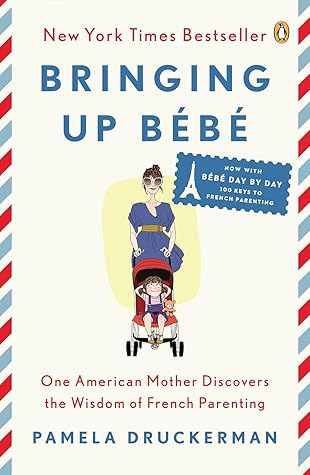More on this book
Community
Kindle Notes & Highlights
A friend of mine who was visiting France complained that he had a hard time finding any adult snack food.)
In other words, Martine is even patient about teaching patience.
Rousseau says the biggest parenting trap is to think that because a child can argue
well, his argument deserves the same weight as your own.
The separate origins of day care and preschool explain why, more than a hundred years later, “day care” still has a working-class connotation in America, while middle-class parents battle to get their two-year-olds into preschool. It also explains why today’s American preschools often last just a few hours a day; it’s presumed that mothers of the students don’t have to work, or can afford nannies.2
Some states don’t require caregivers to have any training.
But magazines urge women to schedule a meeting with the director of their preferred crèche as soon as they have a positive pregnancy test.
“You don’t have to talk, sing, or entertain constantly.” Whatever your view on whether this intensive supervision is good for kids, it seems
What really fortifies Frenchwomen against guilt is their conviction that it’s unhealthy for mothers and children to spend all their time together.
“If your child is your only goal in life, it’s not good for the child,” Danièle says. “What happens to the child if he’s the only hope for his mother? I think this
too. The children learn to raise their hands à la française, with one finger pointed up in the air.
Saying bonjour acknowledges the other person’s humanity. It signals that you view her as
do. The message is that endings don’t have to be tidy to be happy.
A mother I know in Long Island makes a different breakfast for each of her four kids, plus a fifth one for her husband.
Lesson number one is that there’s no such thing as “kids’ food.”
There is no mention of French fries, chicken nuggets, pizza, or even ketchup.
“The foie gras, no?” one chef suggests as an appetizer. Another counters with duck mousse. At first I assume that they’re both joking, but no one laughs.
“If she doesn’t finish a dish, it’s okay. But we all eat the same thing.”
a meal with young kids shouldn’t last more than thirty minutes.
Almost all the French families I know have a large lunch en famille on both Saturday and Sunday.
Whereas for Americans, “health is seen as the main reason for eating.”3
By five years old, sitting calmly at the table for any kind of eating is an automatic reflex for French
weekends. Kids, too, need moments when the regular rules don’t apply.
But parents decide when these moments are.
They can have juice at breakfast, but they know that for lunch and dinner we drink water.
Instead of a constant cycle of escape and reimprisonment, he’s playing happily with the other kids.
But Frederique warns me that there’s no magic elixir for making kids respect your authority.
By forcing Leo to stay in a playpen or in the sandbox, am I preventing him from one day curing cancer?
In France, she explains, “sharing power with a child doesn’t exist.”
“Sometimes there are things in life you don’t really like, and you have to do them,” he says. “You don’t always do what you love or what you want to.”
Another way that French parents and educators build the cadre is simply by talking a lot about the cadre. That is, they spend a lot of time telling their kids what’s permissible and what’s not. All
Rather than saying “Don’t hit Jules,” they typically say, “You don’t have the right to hit Jules.”
A tantrum happens when a child is overwhelmed by his own desires and doesn’t know how to stop himself.
When Bean has a recital for her dance class, I’m not even allowed backstage.
This focus on the negative, rather than on trying to boost kids’—and parents’—morales with positive reinforcement, is a well-known (and often criticized) feature of French schools.
What you’re taught in high school is to learn to reason. You’re not supposed to be creative.
She says that unlike in her French schools, students weren’t immediately criticized for being wrong or for asking dumb questions. Another friend, a French physician who lives in Paris, tells me excitedly about the new
simply make kids addicted to positive feedback.
After a while, they’ll need someone else’s approval to feel good about themselves.
I’ve accepted that if we stay in France, my kids probably won’t ever learn to shoot a bow and arrow. (God forbid they’re ever attacked by eighteenth-century American Indians.)
It’s about acknowledging that children aren’t repositories for their parents’ ambitions or projects for their parents to perfect.
American: if family life is centered entirely on children, it’s not good for anyone, not even for the kids.
Above all, the French think that the best parenting happens when you’re calm.
If she doesn’t eat enough at one meal, she’ll catch up at the next one. If she’s always snacking, she’ll never learn to eat at mealtimes.
Whereas if you treat her like a finicky eater who can handle only grilled cheese and the occasional banana, that’s what she’ll become.
Juice is for breakfast and for the occasional afternoon snack. Sugary drinks are for special occasions like parties.
Don’t let your child see how desperately you want him to eat his vegetables.
It turns out that it’s more important to teach preschoolers skills like concentration, getting along with others, and self-control
Anyway, being a little kid shouldn’t be hard work. There’s enough time for that later.
“If you make a scene, your child will stop talking to you,” she explained.


